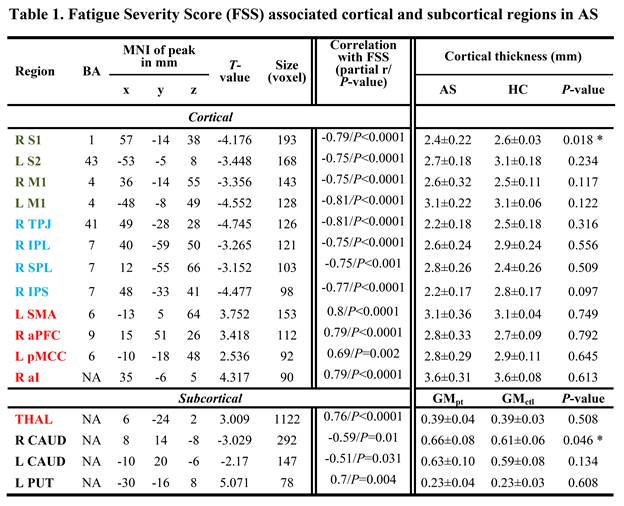Session Information
Session Type: Abstract Submissions (ACR)
Background/Purpose:
Fatigue is one of the cardinal features of ankylosing spondylitis (AS) and contributes substantially to the disability associated with this disease. The mechanisms underlying fatigue in AS remain poorly understood, and this has hampered the development of targeted, effective treatment for this disabling feature of AS. Thus, the current study investigated brain networks underlying fatigue.
Methods:
Twenty patients with back pain secondary to AS (15M/5F; age 34.8 +/- 11.9 yr) and 20 age/sex-matched controls consented to the approved study. Patients underwent clinical assessments for AS including the Fatigue Severity Scale, Affect Intensity Measure and the McGill Pain Questionnaire. 3T MRI was performed to assess brain gray matter (GM) and white matter (WM) connectivity.
Results:
The AS patients had significant fatigue that correlated with measures of their emotional strength as well as spinal mobility. Individual fatigue scores were negatively correlated with the amount of GM in areas of the dorsal and ventral attention networks, the somatosensory cortices, and caudate nucleus, but were positively correlated with GM within the executive control network and putamen (Table 1). Moreover, WM tracts connecting these brain structures (e.g., inferior fronto-occipital fasciculi, superior/inferior longitudinal fasciculi, and corticothalamic tracts) exhibited low fractional anisotropy (indicative of decreased WM tract integrity) in AS patients with high fatigue scores.
Conclusion:
These data indicate that the fatigue in AS involves sensory salience and attention brain networks and suggests that effective therapies for fatigue in AS could target these pathways.
Abbreviations: aI, anterior insula; aPFC, anterior prefrontal cortex; BA, Brodmann Area; CAUD, caudate; CTctl, cortical thickness in healthy subjects; CTpt, cortical thickness in AS patients; GMctl, grey matter volume in healthy subjects; GMpt, grey matter volume in AS patients; HC, healthy control; IPL, inferior parietal lobe; IPS, inferior parietal sulcus; M1, primary motor cortex; MNI, Montreal Neurological Institute; pMCC, posterior middle cingulate cortex; PUT, putamen; S1/S2, primary/secondary somatosensory cortex; SMA, supplemental motor area; SPL, superior parietal lobe; THAL, thalamus.
Acknowledgements/disclosures: Canada Research Chair Program and CIHR (K.D.D.); University of Toronto Centre for the Study of Pain Scholarship, Canadian Pain Society postdoctoral fellowship (Q.W.)
Category: Imaging of Rheumatic Diseases
Keywords (at least three, no more than five): structural brain imaging, attention network, white matter, low back pain
Disclosure:
R. Inman,
None;
Q. Wu,
None;
K. Davis,
None.
« Back to 2013 ACR/ARHP Annual Meeting
ACR Meeting Abstracts - https://acrabstracts.org/abstract/fatigue-in-ankylosing-spondylitis-is-associated-with-the-brain-networks-of-sensory-salience-and-attention/

